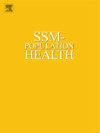Effect of family caregiving on depression outcome among older European adults
IF 3.1
2区 医学
Q1 PUBLIC, ENVIRONMENTAL & OCCUPATIONAL HEALTH
引用次数: 0
Abstract
Background
Most caregiver health studies rely on observational data and traditional regression methods, which fail to account for time-varying confounding, limiting causal inference. This analysis uses inverse probability weighting (IPW) to appropriately account for time-varying confounding in caregiving-depression relationship.
Methods
Using seven waves (2004–2019) of the Survey of Health, Ageing and Retirement in Europe, we estimated the effect of caregiving on probable depression (having 4+ symptoms) comparing daily and some caregiving to no caregiving. We accounted for censoring and potential measured confounding by time-fixed covariates (gender, number of children, country, and education) and time-varying covariates (age, employment, marital status, income, physical limitations, psychiatric medication, receiving help, previous caregiving, and previous depression) using IPCW and IPTW. The product of the two weights was applied to a marginal structural model to obtain the causal estimand on the prevalence difference scale. Confidence intervals were derived from bootstrapping.
Results
Among 36 346 participants and 67 800 person-waves, compared to no caregiving in the last year, daily caregiving was associated with a 6.7 percentage point (95 % CI: 4.8 %, 8.6 %) increase in the prevalence of probable depression, after accounting for time-fixed and time-varying covariates. Some caregiving was not associated with probable depression (PD = 0.5, 95 % CI = −0.8 %, 1.8 %).
Conclusions
Our results support existing findings that high levels of caregiving may increase the prevalence of probable depression, while lower levels of caregiving do not. Accurate documentation of the relationship between caregiving and health outcomes is foundational in creating evidence-based policies to support healthy aging.
家庭照顾对欧洲老年人抑郁结局的影响
大多数护理人员健康研究依赖于观察数据和传统的回归方法,这些方法无法解释时变混杂,限制了因果推断。本分析使用逆概率加权(IPW),以适当地说明时变的混杂在照顾抑郁的关系。方法利用欧洲健康、老龄化和退休调查的七波(2004-2019),通过比较每天和一些护理与不护理,估计护理对可能的抑郁症(有4+症状)的影响。我们使用IPCW和IPTW,通过时间固定的协变量(性别、子女数量、国家和教育)和时间变化的协变量(年龄、就业、婚姻状况、收入、身体限制、精神药物、接受帮助、以前的照顾和以前的抑郁症)来解释审查和潜在的测量混淆。将这两个权重的乘积应用于一个边际结构模型,得到患病率差异尺度上的因果估计。置信区间由自举推导而来。结果在36346名参与者和67800名患者中,与去年没有护理相比,在考虑了时间固定和时变协变量后,每天护理与可能的抑郁症患病率增加6.7个百分点(95% CI: 4.8%, 8.6%)相关。一些护理与可能的抑郁无关(PD = 0.5, 95% CI = - 0.8%, 1.8%)。结论高水平的照顾可能增加抑郁症的患病率,而低水平的照顾不会增加抑郁症的患病率。准确记录护理与健康结果之间的关系,是制定支持健康老龄化的循证政策的基础。
本文章由计算机程序翻译,如有差异,请以英文原文为准。
求助全文
约1分钟内获得全文
求助全文
来源期刊

Ssm-Population Health
PUBLIC, ENVIRONMENTAL & OCCUPATIONAL HEALTH-
CiteScore
6.50
自引率
2.10%
发文量
298
审稿时长
101 days
期刊介绍:
SSM - Population Health. The new online only, open access, peer reviewed journal in all areas relating Social Science research to population health. SSM - Population Health shares the same Editors-in Chief and general approach to manuscripts as its sister journal, Social Science & Medicine. The journal takes a broad approach to the field especially welcoming interdisciplinary papers from across the Social Sciences and allied areas. SSM - Population Health offers an alternative outlet for work which might not be considered, or is classed as ''out of scope'' elsewhere, and prioritizes fast peer review and publication to the benefit of authors and readers. The journal welcomes all types of paper from traditional primary research articles, replication studies, short communications, methodological studies, instrument validation, opinion pieces, literature reviews, etc. SSM - Population Health also offers the opportunity to publish special issues or sections to reflect current interest and research in topical or developing areas. The journal fully supports authors wanting to present their research in an innovative fashion though the use of multimedia formats.
 求助内容:
求助内容: 应助结果提醒方式:
应助结果提醒方式:


